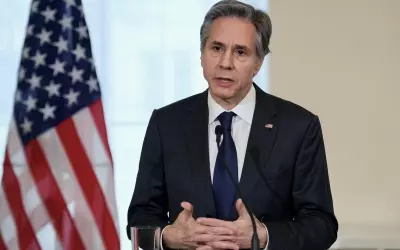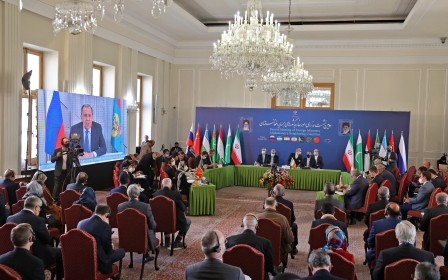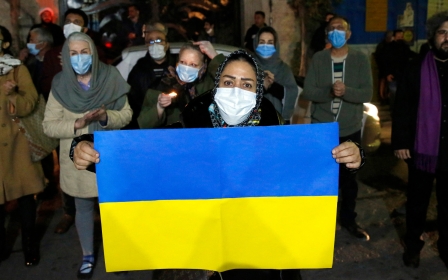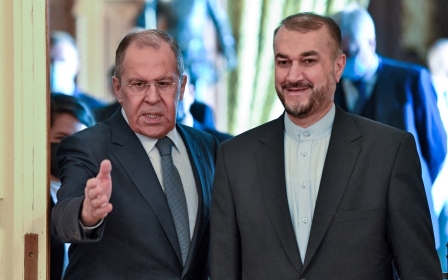Iran nuclear deal: Russia's sanctions demand leaves Iranians fretting
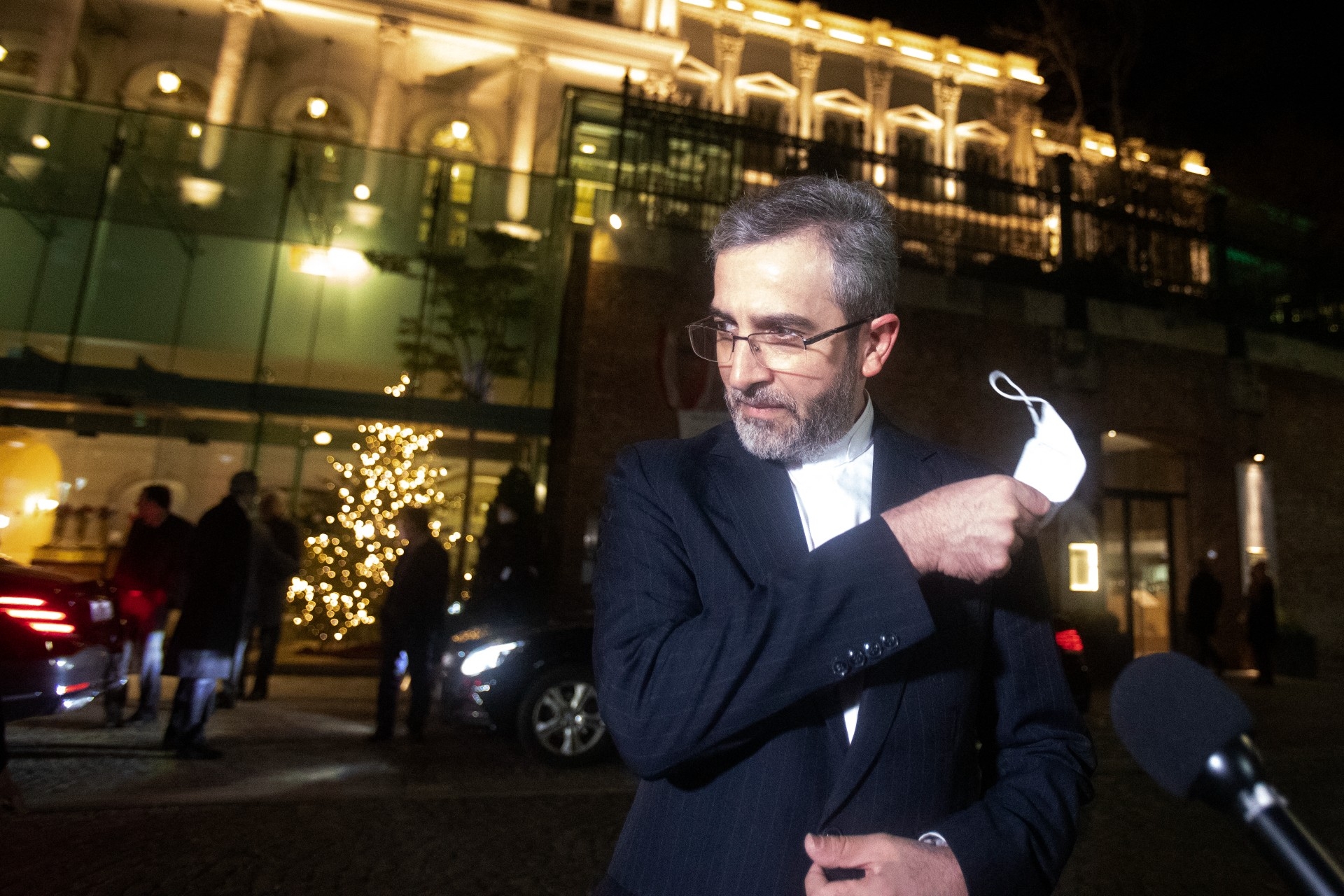
Russian demands that Ukraine-related western sanctions do not harm its dealings with Tehran have cast doubt over the possible success of nuclear talks in Vienna, causing great anxiety in Iran.
Iranians, hoping to finally find sanctions relief after years of US pressure, worry they are being held hostage by Moscow as its invasion of Ukraine turns it into a pariah.
Tehran sees Russia as a key ally and a pillar of its “look to the east” strategy. But the Kremlin’s statements since the weekend have aroused the disbelief and discontent of Iranian officials.
Mohammad Marandi, an adviser to Iran’s negotiators in Vienna, was the first official to react to Moscow’s demand. “Iran is waiting for clarification from Moscow about their demands from the US,” he tweeted on Sunday.
The next day, Saeed Khatibzadeh, Iran’s foreign ministry spokesperson, reiterated Marandi’s statement, saying: “We look forward to hearing the details of [Russia’s foreign minister Sergei] Lavrov's remarks through diplomatic channels.”
“To this date, Russia’s approach has been constructive to the Vienna talks,” he added.
Less pointed but nonetheless interpreted to be directed at Russia, Iran’s foreign minister Hossein Amirabdollahian said: “We will not allow any foreign factor to affect the national interests of the country in Vienna.”
Iranian public anger
When it comes to Russia, the Iranian public is mostly pessimistic, a sentiment rooted in the countries’ shared history over the past two centuries.
In the past two decades, there have been warnings by reformists about Russia’s attempts to dominate Tehran’s decision-makers and take advantage of Iran. Hardline officials in Iran have always rejected this claim.
But this new stance by Russia has given the reformist claim more credence, and angered a public eagerly awaiting a return to the 2015 nuclear deal that brought momentary sanctions relief until Donald Trump unilaterally withdrew the US from it in 2018.
'I hope such statements by Kremlin would trigger a change in Iran’s foreign policy and push it away from Kremlin'
- Former Iranian diplomat
As reformist activist Ehsan Soltani put it: “Iran has been officially taken hostage in the international arena.”
A former Iranian diplomat, who didn’t want his name to be disclosed because of likely repercussions, told Middle East Eye that the Russian demand was “weird”.
He said the most important parties were Iran and the United States, and if they wanted to sign there was nothing Russia, nor the other countries involved in talks, could do about it.
“I don’t think Iran would stand and tolerate such an insult by Russia,” he said. “I hope such statements by the Kremlin would trigger a change in Iran’s foreign policy and push it away from the Kremlin.”
Asked about the importance of Russia in the JCPOA, since Moscow is tasked with shipping 20 percent of enriched uranium out of Iran, he added: “It is no big deal, the US and Europe can easily find another country to do that for Iran.”
For Giorgio Cafiero, CEO of Gulf State Analytics, a Washington, DC-based geopolitical risk consultancy, a Russian sabotage of the nuclear deal would underscore that Moscow has little to gain from the JCPOA being resurrected.
"While Iranians clearly wants to see their country benefit from sanctions relief, Russia has much to gain from Iran’s continued international isolation which has suited Moscow’s interests in many ways," he told MEE.
“Given the fact that Russia has been playing a major role in efforts to salvage the JCPOA, Moscow could succeed in terms of playing this card in order to thwart a revival of the nuclear deal. It is safe to conclude that the more badly the situation in Ukraine becomes for Russia, the more likely it is that Moscow will stick to this demand, which severely complicates the picture at a very sensitive juncture.”
Blowback
According to another former Iranian diplomat, reviving the JCPOA nuclear deal is not now in Russia’s interest.
“Because if the sanctions are lifted and Iranian oil returns to the oil market, the pressure on the market will be decreased and the demand for Russian oil will be reduced to a certain extent,” he said.
“If Russia doesn't cooperate in the Vienna talks, that would prolong the negotiations, and this is a threat to the survival of the JCPOA as time is running out for both sides, while the West claims that Iran’s nuclear breakout will be reached in just a few weeks.”
The knock-on effects of Iran deciding to comply with US sanctions on Russia could be huge.
According to Andrew Korybko, a Moscow-based US analyst, it could affect the future of their strategic partnership and the global energy market.
“Without speculative secondary sanctions pressure on Iran, it and Russia could jointly cooperate much more closely in the global energy market as strategic partners instead of the potential competitors that the US might want to provoke them into being,” he said.
“For these reasons, there shouldn’t be any doubt about how seriously Russia takes its sanctions-related request that was recently made regarding a potentially post-sanctions Iran, since this seems to be an issue of grand strategic importance for it.”
Middle East Eye propose une couverture et une analyse indépendantes et incomparables du Moyen-Orient, de l’Afrique du Nord et d’autres régions du monde. Pour en savoir plus sur la reprise de ce contenu et les frais qui s’appliquent, veuillez remplir ce formulaire [en anglais]. Pour en savoir plus sur MEE, cliquez ici [en anglais].


